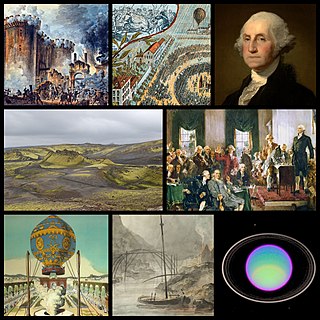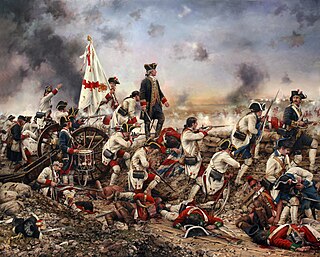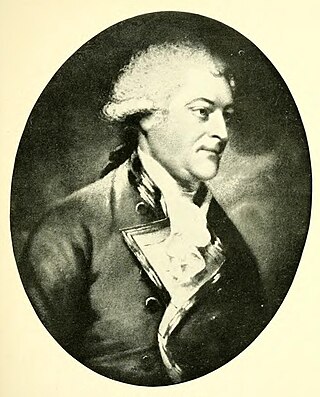Other years |
| Countries of the United Kingdom |
| Scotland |
| Sport |
| 1780 English cricket season |
Events from the year 1780 in Great Britain .
Other years |
| Countries of the United Kingdom |
| Scotland |
| Sport |
| 1780 English cricket season |
Events from the year 1780 in Great Britain .


The 1780s was a decade of the Gregorian calendar that began on January 1, 1780, and ended on December 31, 1789. A period widely considered as transitional between the Age of Enlightenment and the Industrial Revolution, the 1780s saw the inception of modern philosophy. With the rise of astronomical, technological, and political discoveries and innovations such as Uranus, cast iron on structures, republicanism and hot-air balloons, the 1780s kick-started a rapid global industrialization movement, leaving behind the world's predominantly agrarian customs in the past.

1793 (MDCCXCIII) was a common year starting on Tuesday of the Gregorian calendar and a common year starting on Saturday of the Julian calendar, the 1793rd year of the Common Era (CE) and Anno Domini (AD) designations, the 793rd year of the 2nd millennium, the 93rd year of the 18th century, and the 4th year of the 1790s decade. As of the start of 1793, the Gregorian calendar was 11 days ahead of the Julian calendar, which remained in localized use until 1923.

1780 (MDCCLXXX) was a leap year starting on Saturday of the Gregorian calendar and a leap year starting on Wednesday of the Julian calendar, the 1780th year of the Common Era (CE) and Anno Domini (AD) designations, the 780th year of the 2nd millennium, the 80th year of the 18th century, and the 1st year of the 1780s decade. As of the start of 1780, the Gregorian calendar was 11 days ahead of the Julian calendar, which remained in localized use until 1923.

1712 (MDCCXII) was a leap year starting on Friday of the Gregorian calendar and a leap year starting on Tuesday of the Julian calendar, the 1712th year of the Common Era (CE) and Anno Domini (AD) designations, the 712th year of the 2nd millennium, the 12th year of the 18th century, and the 3rd year of the 1710s decade. As of the start of 1712, the Gregorian calendar was 11 days ahead of the Julian calendar, which remained in localized use until 1923.

The Battle at The Village, also known as the Second Battle of Mobile, fought on January 7, 1781, was a failed British attempt to recapture a Spanish fortification at "The Village," during the American Revolutionary War. The attack was led by Waldecker Colonel Johann von Hanxleden who was killed in the attempt.

Spain, through its alliance with France and as part of its conflict with Britain, played a role in the independence of the United States. Spain declared war on Britain as an ally of France, itself an ally of the American colonies. Most notably, Spanish forces attacked British positions in the south and captured West Florida from Britain in the siege of Pensacola. This secured the southern route for supplies and closed off the possibility of any British offensive through the western frontier of the United States via the Mississippi River. Spain also provided money, supplies, and munitions to the American forces.
Events from the year 1770 in Great Britain.

Events from the year 1778 in Great Britain.

During the Age of Discovery, the Spanish Empire undertook several expeditions to the Pacific Northwest of North America. Spanish claims to the region date to the papal bull of 1493, and the Treaty of Tordesillas signed in 1494. In 1513, this claim was reinforced by Spanish explorer Vasco Núñez de Balboa, the first European to sight the Pacific Ocean, when he claimed all lands adjoining this ocean for the Spanish Crown. Spain only started to colonize the claimed territory north of present-day Mexico in the 18th century, when it settled the northern coast of Las Californias.
Events from the year 1779 in Great Britain.
Events from the year 1782 in Great Britain. The American Revolutionary War draws to a close.
Events from the year 1712 in Great Britain.
Diplomacy was central to the outcome of the American Revolutionary War and the broader American Revolution. Before the outbreak of armed conflict in April 1775, the Thirteen Colonies and Great Britain had initially sought to resolve their disputes peacefully from within the British political system. Once open hostilities began, the war developed an international dimension, as both sides engaged in foreign diplomacy to further their goals, while governments and nations worldwide took interest in the geopolitical and ideological implications of the conflict.
Events from the year 1780 in the United States.

The action of 9 August 1780 was a naval engagement during the American Revolutionary War and a part of the Anglo-French War (1778–1783) in which a Spanish fleet, led by Admiral Luis de Córdova y Córdova, along with a squadron of French ships, encountered a large British convoy. The Spanish and French force captured almost all the merchant vessels in the convoy, which dealt a severe blow to the commerce of Great Britain.

The action of 8 January 1780 was a naval encounter off Cape Finisterre between a British Royal Naval fleet under Admiral Sir George Rodney, and a fleet of Spanish merchants sailing in convoy with seven warships of the Guipuzcoan Caracas Company, under the command of Commodore Don Juan Augustin de Yardi. During the action the entire Spanish convoy was captured. Rodney's fleet was en route to relieve Gibraltar, and this action took place several days before Rodney's engagement and defeat of a Spanish fleet at the Battle of Cape St. Vincent.

The San Juan Expedition took place between March and November 1780 during the American War of Independence when a British force under the command of John Polson and Captain Horatio Nelson landed on the coast of the present-day Nicaragua, with the aim of sailing up the San Juan River to capture the strategically crucial towns of Granada and León, located on the northwestern shore of Lake Nicaragua.

The battle for Río San Juan de Nicaragua was one of several battles that took place during the Anglo-Spanish War, a subconflict of the Seven Years' War, which lasted from December 1761 until February 1763. The conflict, which took place in July–August 1762, began when William Lyttelton, the British governor and commander-in-chief of Jamaica, sent a naval expedition to Nicaragua with the primary objective of capturing the town of Granada.

Admiral Robert Linzee was an officer of the Royal Navy who served during the American War of Independence, and the French Revolutionary and Napoleonic Wars.